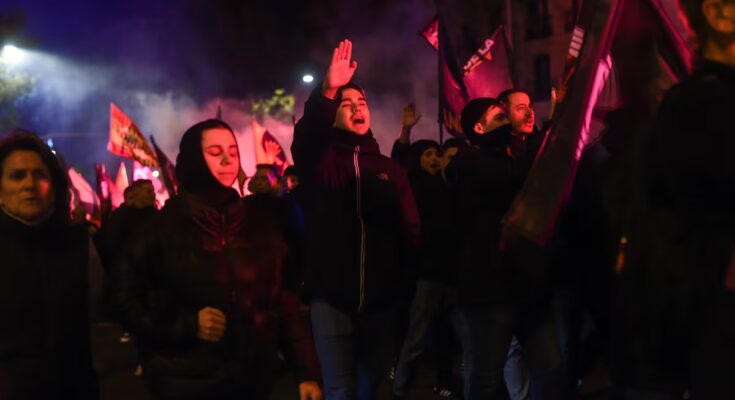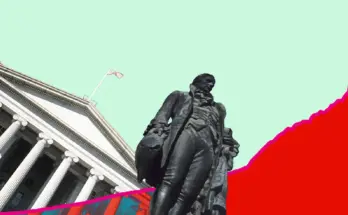The Government Delegation is studying possible sanctions against the Falange demonstrators who this Friday walked through various streets of Madrid making “racist and anti-democratic” shouts and proclamations, as part of a demonstration called with the slogan Against the genocide of ’78in reference to constitutional democracy. During the march, which according to the calculations of the government delegation brought together around 700 people and which was called to commemorate Franco’s death, slogans were raised “for the victims of immigrant violence” and against the president of the government: “Pedro Sánchez, shot in the back of the head!” According to the government delegate in Madrid, Francisco Martín Aguirre, they could constitute “a hate crime”.
The march had been banned by the government delegation, but was later authorized by the Superior Court of Justice of Madrid. “If during the demonstration there are shouts that violate the penal code or the law on democratic memory,” the court argued, “the public authorities must react,” including by dissolving the concentration, but “it is not enough to harbor general doubts about the possible negative effects of a meeting to limit or ban it,” they added.
The Government delegate considers the messages of “racist, xenophobic, homophobic and death threats” expressed during the march to be “extremely serious” and sources from the Delegation explain that the imposition of sanctions provided for by the law of democratic memory and also by the Criminal Code is now being studied to “report the facts to the competent authorities, if necessary”.
Article 62 of the Law on Democratic Memory considers acts that “incite personal or collective glorification of the military insurrection, war or dictatorship, its leaders, participants in the repressive system or organizations that supported the dictatorial regime, when they result in the discredit, contempt or humiliation of the victims or their families”. The fine foreseen in these cases ranges from 10,001 to 150,000 euros. The Secretary of State responsible for democratic memory is competent to initiate and resolve the sanction dossier.
The Minister of Digital Transformation and general secretary of the PSOE in Madrid, Óscar López, referred to the Falange march this Saturday, during a party in the public university. “In that demonstration they shouted for the President of the Government to be shot and I want to ask two things: to Feijóo, who condemns the shouting that occurred yesterday (Saturday) in the streets of Madrid against Sánchez, and to the same judicial system that authorized that demonstration with an appeal from the Falange to now condemn those who asked for a shot in the back of the head for the President of the Government”.
Cross criticisms of the politicization of justice
The leader of the PP, Alberto Núñez Feijóo, has for the moment made no reference to what happened during the Falange march. The party dedicated a good part of its messages of the day to condemning the state attorney general, Álvaro García Ortiz, for having revealed confidential data on the partner of the Madrid president, Isabel Díaz Ayuso. The deputy secretary for Health and Social Policies of the Popular Party, Carmen Fúnez, assured this Saturday in Puertollano (Ciudad Real) that the PSOE seeks to delegitimize the judiciary “to protect one of its own” by presenting the convicted “as a victim and questioning the impartiality of the Supreme Court”. The condemnation of the Attorney General, Fúnez underlined, is also a political condemnation of President Sánchez, who “appointed him, protected him and used him”.
For her part, the second vice president, Yolanda Díaz, took advantage of the political conference of the Sumar Movement this Saturday to accuse a part of the judiciary of “suspending its constitutional functions to intervene in politics” against the progressive government. Díaz insisted that García Ortiz “is innocent”, showed his “surprise” at the announcement of the Supreme Court ruling and accused the PP of “wanting to dominate the General Council of the Judiciary to influence the political life” of the country.



